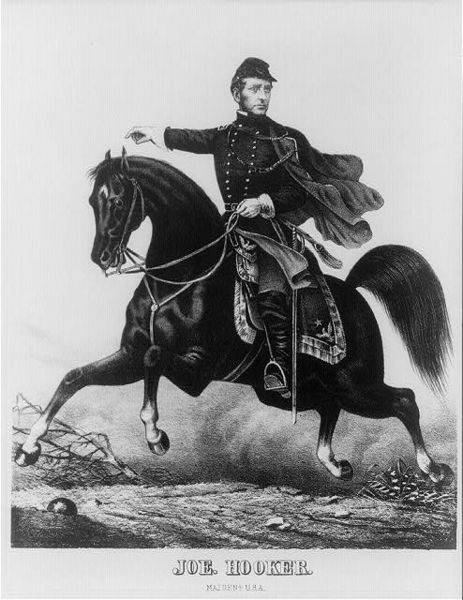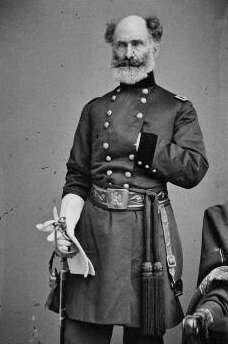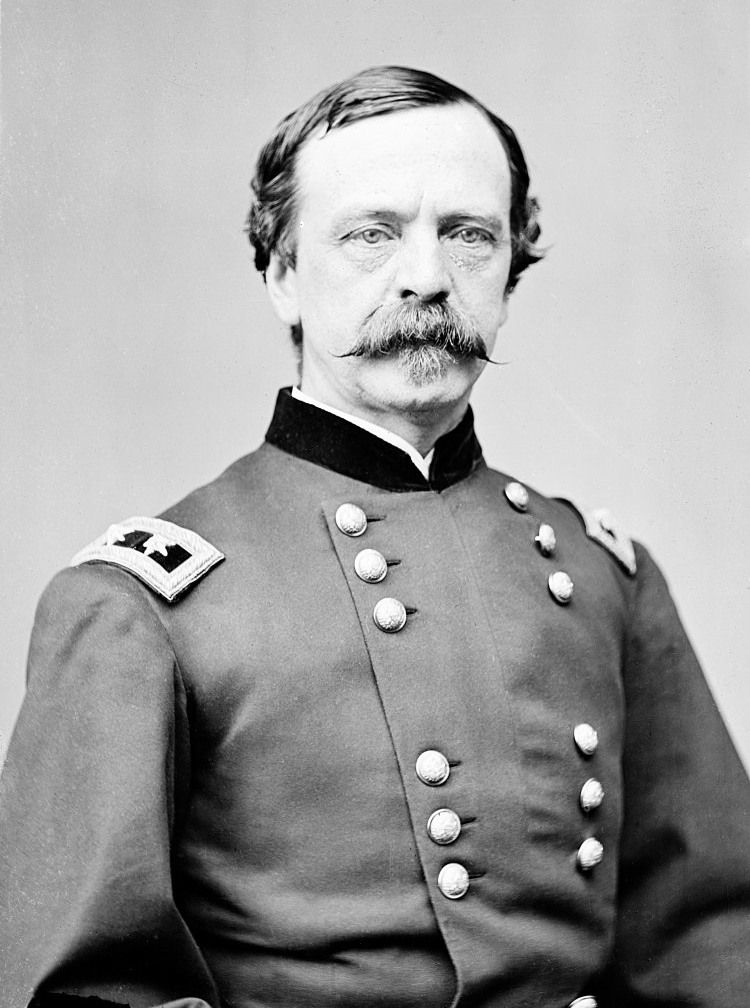The Rebirth of the Army of the Potomac (part four)
 Desertion and “Demagogues”
Desertion and “Demagogues”
Desertion was also a disease in the army, though of a different kind.
With Hooker assuming command the army officially went into winter camp. Morale was still dangerously low and homesickness was a real problem. The men of the Army of the Potomac had been through a great deal since March of 1862. The army had made its way to the Virginia Peninsula and all the way to the gates of Richmond, only to be thwarted by Gen. Robert E. Lee. Lee wrestled the initiative away from Maj. Gen. George B. McClellan, and pressed north towards Manassas Junction, won the Second Battle of Manassas, and took the war across the Potomac.
While Antietam was a tactical Union victory, in the wake of the victory the men lost their beloved McClellan, relieved of command on November 7, 1862. They endured the 77 day tenure of Ambrose Burnside, which included the debacle at Fredericksburg and the humiliating “Mud March.” A command upheaval that included the arrest and/or sacking of numerous high ranking officers left many in the army questioning the high command. “The president it seems has prepared a list of officers who are to be dismissed [from] the service for speaking disrespectfully of his jokes,” snidely remarked Capt. Henry L. Abbott. “His military genius, of course, none but the most demoralized man could jeer at, which…includes all the officers of the Potomac army, who are ‘demoralized as hell’…”
A member of the 7th Michigan, the unit that lead the forlorn hope assault in boats across the Rappahannock River at Fredericksburg on December 11th, grumbled, “I am tired of this way of carrying on war and if this Army stays here much longer there will not be over half their number left on account of desertions nearly all the soldiers are disgruntled with Lincoln’s mode of warfare and if I ever get a chance there will be one less in the Northern army.”[1]

Others bemoaned the Emancipation Proclamation that was signed on January 1, 1863. One soldier from the 7th Massachusetts claimed, “The men are sick of the war and are deserting every day…The soldiers are down on the abolitionists and say they will give them particular fits when they get home again…”[2]
If Fredericksburg or the Emancipation Proclamation did not prompt desertion, Burnside’s “Mud March” did. Their blatant failure to even maneuver into position to strike the enemy was too much for some to bear. “I saw where lots of soldiers had gone having left everything, their tents, their equipment, and in many cases their rifles and ammunition…..It struck me that they must have deserted, and I afterwards found that to be the case. Hundreds of men, being entirely discouraged…Not because they were not patriotic but because they were discouraged beyond endurance.”[3]
The Federal winter camps in Stafford County, Virginia, were a tantalizing distance from Washington D.C. Some of the camps were situated less than 40 miles from the capital. The tantalizing part of Washington was that it represented what many of the men yearned for, a release from the horrors of war. Barrooms, brothels, and the possibility of booking passage home lay just beyond the Potomac River.
What many men did not realize was that those gardens of Eden that they yearned to visit so badly were actually loved by the provost’s of the army. The soldiers were drawn like moths to a flame by these houses of ill repute, where, the provost marshal’s would simply enter and collect the deserters, and ship them back to the army. The problem for the men though was getting there

Marsena Patrick, the army’s crotchety Provost Marshal, claimed “our Troops, are already dispirited by our reverses—Should our Troops be paid off before the next action, I predict very large desertions & no possibility of staying them….”[4]
By the time that Hooker assumed command of the army, morale had hit rock bottom. Men were doing whatever they could to escape. Chief of Staff Daniel Butterfield sent orders to local Potomac River Flotilla commander to stop the crossing of many small boats that were ferrying deserters away from the army.[5] A disturbing report reached headquarters that a Pennsylvania unit, the 132nd, were receiving civilian clothing from home, thus aiding the efforts of the deserters in making good their escape.[6]
One soldier from the 7th Massachusetts went to great lengths to escape the army. After faking and illness, this particular deserter was sent to the hospitals at Aquia Creek. Once there he “obtained a suit of citizen clothing and reported himself to the Provost Marshal as a deserter from an Alabama Regt. got his parole papers and everything [and was] all set to go home when he got drunk and let the cat out of the bag and was sent back to the Regt.”[7]
Desertion was not tolerated by either the Burnside or Hooker administration. “At 2 P. M. [we] witnessed the punishment of a deserter, from the 63rd Pa. Regt. Co. I.” Wrote Sgt. Thomas Stephens of the 20th Indiana Volunteers. “He was punished before the whole brigade, a letter (D) was put on his right thigh, and he was drummed out of the U. S. service to the tune of the ‘Rogue’s March.’”[8]
In another 3rd Corps camp Pvt. John Haley of the 17th Maine described the scene of a member of the 1st New York being drummed out of the army. “He was marched round three sides of a square of soldiers to impress on them the enormity of his crime. His head was shaved and he was escorted out of camp to the tune of the ‘Rogue’s March.’ He deserted his comrades…He wasn’t the only one, but they couldn’t drum out the entire regiment.” Haley went onto say, “The Maine troops thus far have had no love for that particular tune and accompanying exercises: shaved heads, branded hips, and a procession with bayonets at their heels. The New Yorkers have different tastes and the ‘Rouge’s March’ is sweeter music to them than the whistle of bullets or the screaming of shells.” He closed by pondering, “Perhaps we shall have the same feelings when we have been in the show as long and have endured as much as they.”[9]
To help stem these desertion problems, Hooker instituted a new furlough system which allowed both officers and enlisted men to go home for 10-15 days (depending on distance from the army).[10] For every 100 soldiers present, two enlisted men were permitted to go on furlough.[11] One field officer and two line officers at a time were allowed to go home on furlough as well.[12] “Furloughs are …given to the men, and it is hard for me to tell who ought to go [home] first.” wrote Lt. Elisha Hunt Rhodes.[13]

A select number of regiments were allowed to send one extra enlisted man and one extra officer home. “We are one of the regiments selected in gen. orders to have one more officer absent on leave, & one more soldier to the 100 on furlough, for general excellence.” Boasted Capt. Henry Abbott of the 20th Massachusetts. “The only Mass. regts. out of the whole Potomac army [given this honor] are the 1st, 2nd, & 20th. The rest are the 5th & 10th New York, two famous regiments, 1st Minnesota, 111th Penn., 10th & 19th Maine, & a few other from other states.”[14]
Some men had not seen their homes and loved ones since May of 1861, so the new furlough system went a long way to boost morale of them men going home.[15]
On top of the improved supply system, camp health and furloughs, Hooker took one final, and major step in increasing morale. He broke apart the grand division system, which was both unwieldy and overly complicated. In its places was installed the old corps system. To each of the infantry corps was issued new identification badges. Known collectively as “Corps Badges”, these small symbols helped commanders identify units on the field by both division and corps. “Gen. Dan Butterfield, who became Hooker’s Chief of Staff originated the idea and devised the badges in detail…”[16] Soldiers took to these distinct identifiers almost immediately. “For the better recognition of Corps and Division, he recently ordered that all officers & men in the several corps should wear badges…” wrote First Lieutenant Cornelius L. Moore, “…Ours is a ‘tree foil’ –color, red—1st Division, 2nd Corps Now you will know, if you ever meet a soldier with the latter on the centre of the top of his cap, that he belongs to Hancock’s Division.”[17] They were a point of pride that many of the men carried with them in some way or form, for the rest of their lives.
Hooker had made his mark in a very positive way on the army thus far. No issue seemed to be too large or too small to catch his attention. “Since General Hooker assumed command, we have frequently seen him, and he appears to be looking after affairs. He is a fine appearing soldier, with smooth shaven face, and as a division commander, has been very successful. He is a high liver, has a reputation for gallantry, and keeps a good many society people about his headquarters. Anything of course, is an improvement on Burnside and we all hope Hooker may prove a success.”[18]
“The Army was never in a better condition for fighting,” boasted one Federal soldier. “…the discipline is capital, the number of sick remarkably small. The confidence in our commanding General is rapidly growing, and the men look upon his as of ‘sterner stuff.’ I think there never was a general, except Bonaparte, who ever had their Army more directly ‘under their eye,’ as it were—every department receives his attention, and there seems to be no item however trifling it may appear, but that receives his attention. This, {even} the most ardent McClellan worshipers are forced to acknowledge.”[19]

As winter began to loosen its grip on the east coast, the Army of the Potomac had come nearly full circle. Morale was sky rocketing in many of the camps. The men of the 140th Pennsylvania named their camping ground “Camp Hope.”[20] Unit efficiency was up, due to the added amount of drill time ordered up by Hooker. All of these changes were for the positive, and looked very good on, and in, the papers. Yet Hooker still did not have the most stellar reputation in the army. His ascent to command was stained with backbiting, arrogance, and deceit. With the men, “Gen Hooker is very popular already, and a victory or two will make the soldiers enthusiastic admirers of him.”[21] Those who knew his prewar reputation and the man himself, had their doubts that he was the one to bring Lincoln those victories that the nation so desperately needed.
The 5th Corps commander, George G. Meade, served under Hooker during a portion of his time in 1st Corps. “Hooker is a very good soldier and a capital officer to command an army corps,” Meade wrote to his son John in October of 1862, “but I should doubt his qualifications to command a large army. If fighting, however is necessary to make a general, he will certainly distinguish himself.”[22] Meade had much respect for the man, and within the officer corps seemed to be in the minority.
Captain Charles Francis Adams, whose family had deep roots tying him to the Revolution, railed against Hooker.
“Hooker in no way and in no degree represents the typical soldier ship of the commonwealth [of Massachusetts]. Chancing to be born in Massachusetts, he was in 1861 and from that time forward little better than a drunken, West Point military adventurer…he was altogether void of character, insubordinate and intriguing…”
Adams went on to say,
“It is true that after superseding Burnside he did some effective work towards organizing the Army of the Potomac. Nevertheless that was a period in its history when, so far as character was concerned, the Army of the Potomac sank to its lowest point. It was commanded by a trio, of each of whom the least said the better. It consisted of ‘Joe’ Hooker, ‘Dan’ Sickles, and ‘Dan’ Butterfield. All these were men of blemished character. During the winter of 1862-63, when Hooker was in command…headquarters of the Army of the Potomac was a place to which no self respecting man liked to go, and no decent woman could go. It was a combination of bar room and a brothel…Sickles, Butterfield, and Hooker are the disgrace and bane of this army; they are our three humbugs, intriguers, and demagogues.”[23]
The historian of the 1st Minnesota described Hooker as having “…a petulant temper and indulged it frequently.”[24]

Cooler heads assessed Hooker in a more level light. Private Warren Lee Goss reminisced “Hooker had been identified with the battles and history of this army from the beginning, and by his dashing bravery…It was the general feeling among the rank and file that he was more likely to err from over-rashness and daring than to fail by over caution.”[25]
While men of the 3rd Corps revered their former 2nd Division commander, “I am delighted with Genl. Hooker. He is a perfect model of a gentleman…I don’t wonder that Hooker is so much loved by all that know him. To know him is but to love him…” gushed Colonel Robert McAllister.[26]
By April, Hooker had the confidence of most of the army. The chaplain of the 145th Pennsylvania wrote glowingly “General Hooker is very popular already, and a victory or two will make the soldiers enthusiastic admirers of him.”[27] Lt. Col. Richard McMichael thought “That we placed firm reliance and implicit, confidence in our brave and noble leader, Maj. Gen. Joseph Hooker, and believe him to be a capable and fearless leader.”[28]
The historian for the 10th New York proudly declared, “Gen. Hooker….upon assuming command, immediately began improving the discipline and perfecting the organization of his troops, and with such success that he, some two months afterwards, as he declared, ‘the finest on the planet.’”[29]
Endnotes:
[1] John Morton to Dear Mother, dtd. January 13, 1863. Miscellaneous Collection U.S. Army History Institute.
[2] Morton Hayward to Brother, dtd. December 23, 1862. Fredericksburg and Spotsylvania National Military Park Bound Volume Collection, Vol. 108. Hayward served in the 7th Massachusetts Infantry. The original letter is housed in the Lewis Leigh Collection at U.S. Army History Institute.
[3] The Civil War Diary of Wyman S. White First Sergeant of Company “F” of the 2nd United States Sharpshooter Regiment (New Hampshire Men) In the Army of the Potomac, 65-66.
[4] Marsena Patrick Diary Entry dtd. January 11, 1863. David S. Sparks, ed., Inside Lincoln’s Army: The Diary of General Marsena Patrick, Provost Marshal General, Army of the Potomac (New York: Thomas Yoseloff, 1964), 202.
[5] OR 25, Pt. 2, 36-37.
[6] Ibid., 73. William French to Captain Howard, dated February 6, 1863.
[7] Morton Hayward to Brother, dtd. February 9, 1863. Fredericksburg and Spotsylvania National Military Park Bound Volume Collection, Vol. 108. The 7th Massachusetts was camped near White Oak Church at the time, off of modern day Virginia Route 218. The original letter is housed in the Lewis Leigh Collection at U.S. Army History Institute.
[8] Diary entry of Thomas White Stephens dtd. January 18, 1863. Paul E. Wilson, Harriet Stephens Wilson, ed. The Civil War Diary of Thomas White Stephens Sergeant, Company K. 20th Indiana Regiment of Volunteers (Lawrence, KS.: Self Published, 1985), 44.
[9] January 6, 1863 diary entry of John Haley. John Haley, The Rebel Yell & the Yankee Hurrah: The Civil War Journal of a Maine Volunteer, ed. Ruth L. Silliker (Camden, ME.: Down East Books, 1985), 66.
[10] OR 25, Pt. 2, 11-12. Hooker’s General Orders Number 3, dated January 30, 1863. Soldiers from Maine, Vermont, New Hampshire, Ohio, Michigan, and states west of there were permitted 15 day passes.
[11] Ibid. One issue that Hooker and the high command had to deal with was the inept way the army’s Provost Marshal had been dealing with passes in and out of camp. Brigadier General Marsena Patrick, the Provost for the Army of the Potomac, was doing a poor job in regulating expired and foraged passes which allowed soldiers and civilians in and out of camp.
[12] Ibid.
[13] Rhodes diary entry of February 18, 1863. Robert Hunt Rhodes, ed. All for the Union: The Civil War Diary of Elisha Hunt Rhodes (New York: Orion Books, 1991), 100.
[14] Henry Abbott to Papa dtd March 5, 1863, in Robert Garth Scott, ed. Fallen Leaves: The Civil War Letters of Major Henry Livermore Abbott (Kent, OH.: The Kent State University Press, 1991), 169. The ever arrogant Abbott also boasted that “There [are] a large number, mostly of course from New York & Penn., cut off from leaves & furloughs altogether, on account of general inferiority.”
[15] OR 25, Pt. 2, 11-12.The furlough system did create some antipathy in regiments. Jealously amongst the men who were not on furlough was common. Also, men were not allowed to go on furlough until the other men arrived back in camp.
[16] R. I. Holcombe, History of the First Minnesota Volunteer Infantry 1861-1864 (Stillwater, MN.: Easton & Masterman, 1916), 280.
[17] Cornelius L. Moore to My Dear Sister, letter dtd. March 30, 1863. Gilbert C, Moore, Jr., ed. The Civil War Letters of Lt. Cornelius L. Moore, Co. I, 57th Regiment, New York State Volunteers (Chattanooga, TN.: G. C. Moore, Jr., 1989), 89-90. Moore’s letter included sketches of each corps badge issued to the Army of the Potomac.
[18] Diary entry of February 17, 1863. Josiah M. Favill, The Diary of a Young Officer: Serving with the Armies of the United States During the War of the Rebellion (Chicago, IL.: R.R. Donnelley & Sons Company, 1909), 224.
[19] Cornelius L. Moore to My Dear Sister, letter dated March 30, 1863. Moore, The Civil War Letters of Lt. Cornelius L. Moore, Co. I, 57th Regiment, New York State Volunteers, 89-90.
[20] Benjamin F. Powelson, History of Company K of the 140th Regiment Pennsylvania Volunteers 1862-’65 (Steubenville, OH.: Carnahan Print Company, 1906), 17.
[21] Hedrick and Davis, I’m Surrounded by Methodists…Diary of John H. W. Stuckenberg Chaplin of the 145th Pennsylvania Volunteer Infantry, 57. Letter to unknown dated April 14, 1863.
[22] Letter from George G. Meade to John Meade, dtd. October 11, 1862. George G. Meade, The Life and Letters of George Gordon Meade: Major General United States Army, George G. Meade, Jr., ed. (New York: Charles Scribner’s Sons, 1913), Vol. I, 318.
[23] Charles F. Adams, Charles Francis Adams, 1835-1916, An Autobiography (Boston: Houghton Mifflin Company, 1916), 161. Daniel Sickles was the commander of III Corps, who had risen to that command on the coat tails of the commanding general. Sickles and his character will be examined later in this work.
[24] Holcombe, History of the First Minnesota Volunteer Infantry 1861-1864, 280.
[25] Warren Lee Goss, Recollections of A Private: A Story of the Army of the Potomac (New York: Thomas V. Crowell & Co., 1890), 140. Goss was impressed by the way Hooker carried himself at Fredericksburg, namely going against Burnside when he wanted to continue the assault against Marye’s Heights, “Hooker was a brave man and not always judicious, but one of the bravest acts of his life was his remonstrance with Burnside against the needless slaughter.” Goss, Recollections of A Private: A Story of the Army of the Potomac, 129.
[26] Robert McAllister to Ellen, dated December 8, 1862. Robert McAllister, The Civil War Letters of General Robert McAllister, ed. James I Robertson, Jr. (Baton Rouge, LA.: Louisiana State University Press, 1998), 238.
[27] John H. W. Stuckenberg, diary entry dated April 14, 1863. David T. Hedrick & Gordon Barry Davis, Jr. I’m Surrounded by Methodists…Diary of John H. W. Stuckenberg Chaplin of the 145th Pennsylvania Volunteer Infantry (Gettysburg, PA., Thomas Publications, 2000), 57.
[28] Richard McMichael to William Lewis, dated April 17, 1863. Irvin G. Myers, We Might As Well Die Here: The 53rd Pennsylvania Veteran Volunteer Infantry (Shippensburg, PA.: White Mane Publishing, 2004), 73.
[29] Charles W. Cowtan, Services of the Tenth New York Volunteers (National Zouaves) in the War of the Rebellion (New York: C.H. Ludwig, 1882), 180-181.
nice history, success..